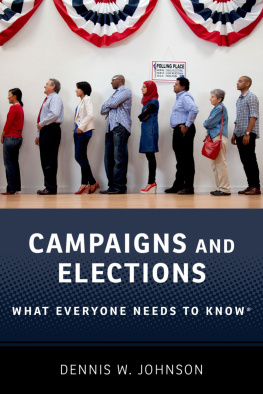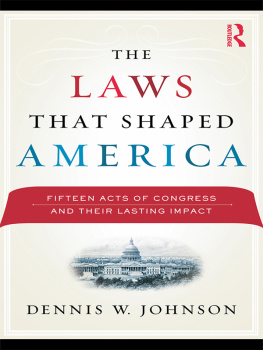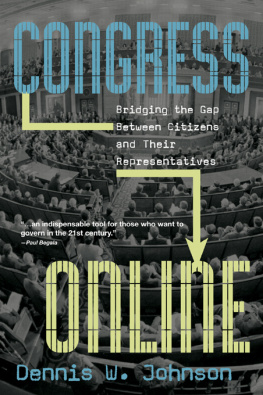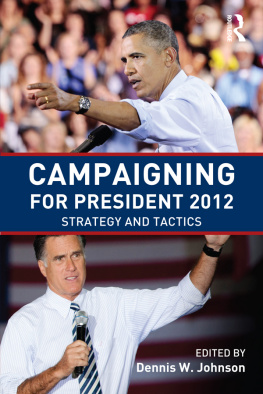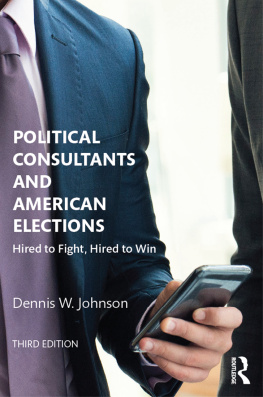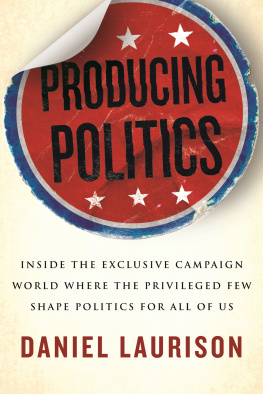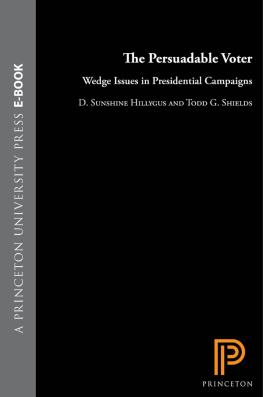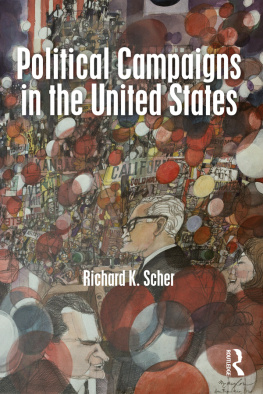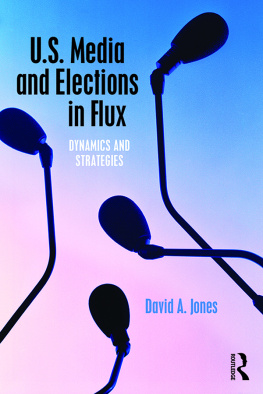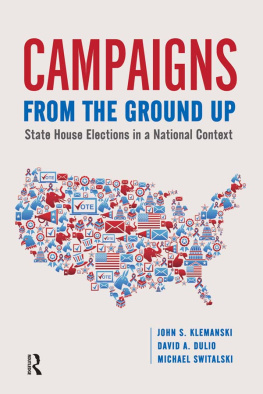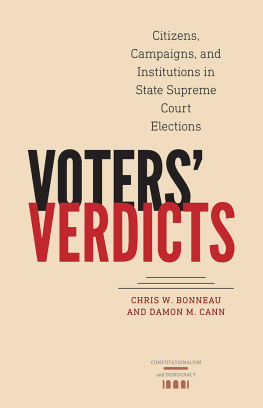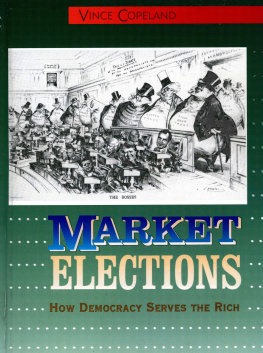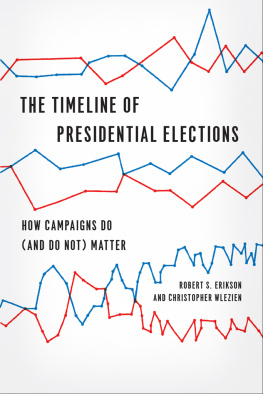CAMPAIGNS AND ELECTIONS
WHAT EVERYONE NEEDS TO KNOW

Oxford University Press is a department of the University of Oxford. It furthers the Universitys objective of excellence in research, scholarship, and education by publishing worldwide. Oxford is a registered trade mark of Oxford University Press in the UK and certain other countries.
What Everyone Needs to Know is a registered trademark of
Oxford University Press.
Published in the United States of America by Oxford University Press
198 Madison Avenue, New York, NY 10016, United States of America.
Oxford University Press 2020
All rights reserved. No part of this publication may be reproduced, stored in a retrieval system, or transmitted, in any form or by any means, without the prior permission in writing of Oxford University Press, or as expressly permitted by law, by license, or under terms agreed with the appropriate reproduction rights organization. Inquiries concerning reproduction outside the scope of the above should be sent to the Rights Department, Oxford University Press, at the address above.
You must not circulate this work in any other form and you must impose this same condition on any acquirer.
Library of Congress Cataloging-in-Publication Data
Names: Johnson, Dennis W., author.
Title: Campaigns and elections : what everyone
needs to know / Dennis W. Johnson.
Description: New York : Oxford University Press, 2020. |
Includes bibliographical references and index.
Identifiers: LCCN 2019006861 (print) | LCCN 2019009365 (ebook) |
ISBN 9780190935597 (Updf) | ISBN 9780190935603 (Epub) |
ISBN 9780190935580 (hardcover : alk. paper) |
ISBN 9780190935573 (pbk. : alk. paper)
Subjects: LCSH: Political campaignsUnited States. |
Campaign managementUnited States. | Politics, PracticalUnited States. |
ElectionsUnited States. | DemocracyUnited States.
Classification: LCC JK2281 (ebook) | LCC JK2281 .J622 2020 (print) |
DDC 323.70973dc23
LC record available at https://lccn.loc.gov/2019006861
For Pat, with all my love
Contents
The right of all citizens to vote and participate in elections is a bedrock principle of American democracy. It has been a hard-won right, overcoming prejudice, stubborn resistance, and blatant discrimination grounded in state law and practice. In our textbook versions, citizens are given the opportunity to choose their representatives and to vote on issues without fear of intimidation, knowing that the elections will be fairly conducted, and the decision of the voters will be abided by. Citizens also are assured that elections will be held on a frequent and regular basis, usually every two or four years. Our concept of democracy also assumes that citizens will be active in public affairsnot just voting, but also learning about issues, supporting candidates for office, even donating money and working on campaigns.
But now, as we are entering the third decade of the twenty-first century, our campaign and election systems are not working the way the textbooks taught us. We have seen profound changes in how campaigns are conducted, how voters get their information, who gives money to campaigns, how the highest court has interpreted the relationship between money and free speech, how campaign consultants have used their influence, and how outside forces have tried, and sometimes succeeded, to impact elections.
Before we move on, lets define two key words: elections and campaigns. Through an election, citizens have the chance to choose from among candidates for public office who will, if elected, vote on policy issues. Usually, elections are held on a fixed day, very often in early November for a general election. Sometimes there are special elections (often to fill a seat vacated by a death or resignation), primaries (to determine which of several candidates will represent a political party), and, occasionally, runoff elections (when the leading primary candidates have not reached a certain percentage of voters during the first round). In over half the states, an election can also include ballot issues, where there is no candidate, only policy issues at stake (for example, whether to have a lottery or permit marijuana for recreational use). Elections are conducted and monitored by state and local officials, candidates are chosen to fill government jobs, and policy issues are decided.
A campaign is the active side of an election: announcing a candidacy, raising and debating issues, scheduling meet-and-greet dinners and rallies, raising campaign funds, identifying potential voters, communicating through social media and television, and getting voters out to the polling stations. Much of what well discuss in this book deals with the changing dynamics and mechanisms of campaigning.
And over recent years, unfortunately weve seen some disturbing trends.
Thanks to federal court decisions, the federal campaign-finance laws have been almost entirely blown out of the water. We used to require transparency; now millions of campaign dollars can be hidden. We used to have limits on the amount of money that can be donated or spent; thats almost all been taken away.
The result is that a handful of mega-donors, those willing to give $25 million or $50 million of their own money (often hidden from public view) to a campaign can have a major impact on statewide and other races.
Campaigns are no longer contests between one candidate and another. Organized interests (many of them hidden behind innocent-sounding names) have flooded campaigns with their pitches, ads, and organizational muscle.
In the 2016 presidential election, more adults sat at home than voted for either Donald Trump or Hillary Clinton. In many big-city mayoral elections, little more than 15 percent or 20 percent of the voters cast ballots.
Many voters simply dont know what media to trust anymore. Fake news found on social media sites, much of it coming from other countries, confuses voters and distorts reality. A president barking fake news and disparaging the mainstream press certainly doesnt help.
Mistrust of government and its institutions is at an all-time high, and partisanship and the ideological divide are as corrosive as they have ever been.
This book will try to sort out what is real, what is confusing, and what everyone should know about campaigns and elections. It poses 126 questions and answers that are based on federal law and court decisions, the findings of scholars and campaign practitioners, and analysis of historical events.
The book is divided into ten chapters, with questions and answers focused on a common theme. is devoted to the role of political parties and elections. How have the Democratic and Republican parties changed over the years? Why dont we have other parties popping up to challenge them? How many people consider themselves independents, and how do they vote during elections? Well also ask whether political parties have surrendered their role in campaigning to wealthy donors and super PACs.
In , we look at presidential elections. Several questions surround our cumbersome and antiquated electoral college system: Why do we have this system in the first place? How and when did it break down? Is it a fair system? Who wants to change it and how could it be changed? Well also look at questions about our lengthy primary system: How did we get to the point of having all these primaries, and arent there ways to shorten the process? Why dont we have a straight up and down nationwide vote where whoever gets the most votes, wins?

